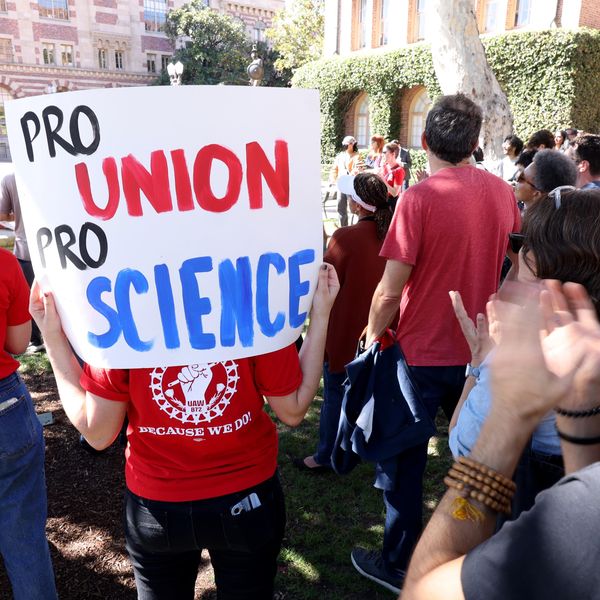The President of the United States of America is a sexual predator. During his campaign, a now-infamous tape leaked of Donald Trump boasted about assaulting women. He subsequently dismissed the comments as casual "locker room banter." The scandal -- and the nineteen women who accused him of sexual assault -- contributed to national discussions about the prevalence of harassment across the country, especially on college campuses. Now a man who doesn't understand consent is president, and the conversation must turn to what's next. And while there remains much to witness, the appointment of Betsy DeVos as Secretary for Education, proves that Trump's administration will not stand up for the rights of survivors of sexual assault.
As a donor and lobbyist, DeVos has financially supported the Foundation for Individual Rights in Education (FIRE), an organization that, provides legal assistance and advocates for the rights of perpetrators of sexual assault on college campuses. And during her confirmation hearing, Devos was asked by Sen. Robert P. Casey Jr. (D-PA) whether she would uphold the 2011 guidance on Title IX which requires colleges and universities to actively work to prevent and appropriately respond to sexual assault on campuses. She refused to answer. She said, "it would be premature to do so."
Student organizers, administrators, and community advocates rely on Title IX policies and funding which require colleges and universities to actively work to prevent and appropriately respond to sexual assault on campuses. An attack on this guidance will have enormous effect on students and survivors. Across the country, young women and their allies are speaking out for their rights, safety, and autonomy. And their power is growing.
I offer a microcosm of young people standing up to the establishment to highlight a hopeful trend: I am a student and campus organizer for the rights of sexual assault survivors at Northeastern University in Boston. The Sexual Assault Response Coalition (SARC) started in 2014 as an advocacy campaign to support survivors at a university that seeks to silence them. The first campaign centered on a proposal to establish a gender resource center on campus. Subsequent campaigns have included advocating for an increase of confidential resources for students on campus, promoting visibility around mandated reporting, fairly analyzing and publicizing the results of campus climate surveys, and reforming the Student Conduct Board so students are not deciding the legitimacy of sexual assault cases and determining punishment for perpetrators at Northeastern.
This is an especially poignant time for this work due not only to the threat of Trump and DeVos, but also to a Title IX lawsuit currently against Northeastern University. In 2013, the institution mishandled a sexual assault case and is now facing repercussions. Morgan Helfman, a student of political science and sociology, is sueing Northeastern, as well as five individual administrators, for negligence, breach of contract, violation of Title IX, intentional and negligent infliction of emotional distress, violation of the state equal rights act, and misrepresentation of crime statistics by the school. This is not the first time allegations of this nature have been made against Northeastern. In this era, in this political climate, student are in solidarity with Morgan and are demonstrating it boldly.
When these allegations came out, the Sexual Assault Response Coalition engaged in supportive dialogue with our community to share experiences and build consciousness around the nature and character of sexual assault at Northeastern. We organized a direct action to drop a banner on campus reading "Students Stand With Survivors". A banner was also dropped later by a student reading "Northeastern Protects Rapists". The administration removed both banners and threatened the students with disciplinary action. However, our visibility and power grew and this semester student engagement, participation, and interest in the campaign is at an all time. Students are resisting the policies and procedures of the university, coming together in resilience and courage, knowing unity is even more important given the current regime.
All around the country, students are in action; conversations driven by the women's marches in cities across the US and the world are bringing gender issues to the table. Whether we are marching or growing local campaigns, this movement is being led by intersectional, millennial feminists who understand that we cannot talk about sexual assault without talking about how it unfairly affects black, brown, queer, non-binary, trans, Muslim, and immigrant lives. We understand that men are survivors of sexual assault; we understand how to work in coalition; we are ready for this fight.
This is a terrifying time, both on college campuses and around the country, to be a survivor of sexual assault under the current administration. But there is hope and power building among students, not just on Northeastern's campus, but in campuses across the country. We are advocating for our safety, health, human rights, and autonomy. We are resisting the tides that seek to normalize sexual assault and devalue our experiences. Together, with the power of community and resistance, we are building a grassroots movement and if Betsy DeVos revokes Title IX funding we will stand up and fight back.


